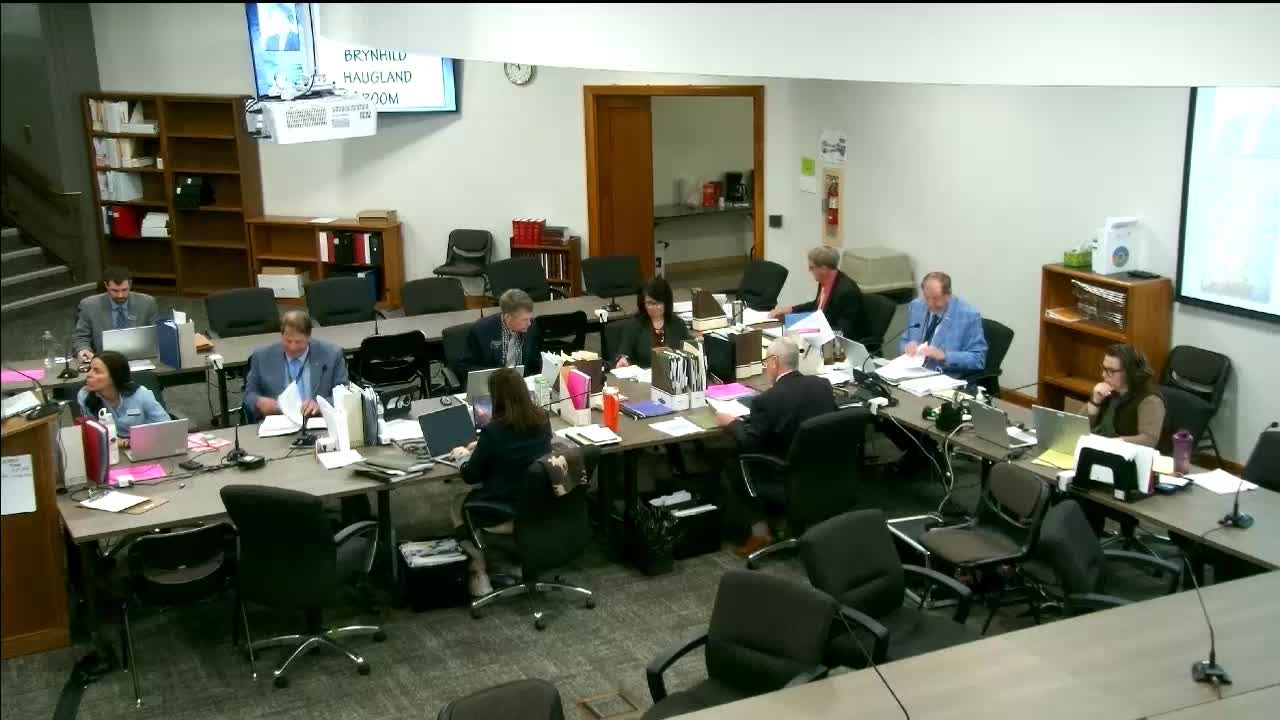Industrial Commission budget hearing: grant system support, transmission contract, grid resiliency grants and litigation funding discussed
Get AI-powered insights, summaries, and transcripts
Subscribe
Summary
The Industrial Commission administration asked the House Appropriations — Government Operations Division for ongoing support of its new grant management system, continued funding for the Transmission Authority executive director contract, federal grid resiliency grant match authority and another $3 million request for lignite litigation.
Karen Tyler, executive director of the North Dakota Industrial Commission administrative office, briefed the House Appropriations — Government Operations Division on the commission’s budget requests, including ongoing support for a new grant management system, continued funding for transmission authority staffing, a federal grid resiliency grant package and one‑time litigation funds for lignite cases.
Tyler told the committee the commission seeks $275,000 in ongoing support for a grant management system initially funded at $1,250,000; the system will manage the commission’s primary energy grants — renewable energy, oil and gas research, lignite research, the Clean Sustainable Energy Authority and the Outdoor Heritage Fund — and is scheduled for completion in October 2025. She said the $275,000 breaks down to roughly $52,000 per program per biennium and the programs will share ongoing costs.
Tyler also asked the committee to convert $400,000 in funding into ongoing support for the Transmission Authority executive director contract (Claire Vegasaw), an arrangement the commission described as similar to other professional services contracts it administers. Claire Vegasaw, the Transmission Authority executive director, described prior grant rounds funded by the Infrastructure Investment and Jobs Act and said the program helps utilities bury lines, install sectionalizing switches and modernize controls to reduce large‑scale outages. Vegasaw said awardees provide substantial cost share — often a third or more of project costs.
On the electrical grid resiliency program, Tyler and Vegasaw said recent rounds authorized grants to utilities such as Capital Electric Cooperative, Otter Tail Power and Northern Plains Electric for projects ranging from burying vulnerable lines to installing switches and remote control technology. The current request in the long sheet is $13,668,000 total for fiscal years 2024‑26, which they reported consists of $11,885,295 federal funds and $1,782,794 state match; the Senate had proposed the match come from the Strategic Investment Fund (SIF) rather than general fund.
The commission also requested another one‑time $3,000,000 for ongoing lignite‑related litigation. Tyler told the committee $2.7 million of the prior $3,000,000 appropriation has been spent and that litigation effort remains active across multiple EPA and rulemaking matters; the Senate proposed funding the new $3,000,000 from SIF. Committee members requested a status update and Tyler said staff would arrange for the solicitor general to brief the committee on case timelines.
Tyler reviewed succession and compensation issues. The request includes $350,000 in ongoing funding split $245,000 to the Industrial Commission administration and $105,000 to the Public Finance Authority (PFA) to address succession planning and compressed salaries for future hires. The commission reported the PFA executive director salary was about $145,000 and the Industrial Commission executive director was about $169,000; Tyler said the commission would prefer the PFA director be closer to $160,000 and the Industrial Commission director nearer $200,000 for future hires. Committee members debated restoring a prior transfer of about $581,422 from salaries to operating in the base and discussed whether to leave the Senate’s $350,000 in place; the committee directed staff to correct the transfer so the salary line reflects the intended base and then treat the Senate $350,000 as a separate policy decision during conference.
Other items discussed included a $50,000 inflation/operating increase (the Senate included $50,000 of a $100,305 request), $15,200 in professional development and $369 in IT cost changes, all described as modest operating items. The committee also discussed a reduction in state funding for underground energy storage (salt cavern) feasibility from $6,000,000 to $2,000,000, with the commission planning to return with more detail.
Tyler said many Industrial Commission programs are special‑funded and pay for the admin office through assessments; she told the committee the PFA is self‑funded through bond transaction revenue and SRF loan income. Committee members asked staff to provide additional line‑item detail so legislative members could see the base operating and salary components more clearly when evaluating ongoing versus one‑time requests.
No final committee vote on the Industrial Commission budget worksheet was recorded in the transcript segment provided; members continued with other agenda items.
